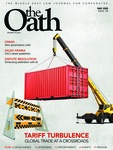Construction industry unites to reduce disputes costs

Six leading professional institutions, and two leading transport and infrastructure firms have launched a Conflict Avoidance Pledge, aiming to reduce the number of disputes in construction and engineering.
With many projects costing c.30-40 per cent more than the original contract target price, employers and contractors often end up in dispute over unforeseen cost and associated delays. Thus, distracting parties from project delivery.
The pledge, created by the Conflict Avoidance Coalition Steering Group* – who work to help the industry reduce the costs of conflict, and ensure major infrastructure and property developments are delivered on time and within budget – is a voluntary commitment self-assessment open to any organisation or firm regardless of size or location. At the official launch event in London, guests heard from: Chief Executive of the Specialist Engineering Contractors’ (SEC) Group, Rudi Klein, a driving force behind the improvements already made to payment performance in the construction sector; London Transport Commissioner, Mike Brown; and speakers from Transport for London** and Network Rail, who are already implementing conflict avoidance techniques.
The Pledge is the focal point of a wider campaign, created by the Steering Group to drive behaviour change in the way relationships and disputes are managed throughout the construction and engineering sector. The Steering Group aims to reduce the financial costs associated with disputes by promoting cooperation between contracting parties. The pledge intends to aid the industry’s understanding of conflict management measures, which will ensure projects are delivered on time and within budget.
Over 50 industry bodies have signed the Pledge with a key ambition of the Steering Group to encourage more organisations to join the coalition.
John Fletcher RICS product group director ADR said, “Too often, employers encourage contractors to submit compliant bids for the best price, while contractors, on the other hand, apply a commercial strategy to win the bid. Both sides then seek to manage contracts to their terms. The result is a recipe for disputes, which is built into contracts before they even start. It is only when the industry unites to tackle these all too common issues that we can deliver real change. We look forward to more organisations and companies joining our campaign by signing up to the Pledge and making the running of construction and engineering projects, hopefully across the world, more streamline.”
Moving forward, the Steering Group is developing a set of guidance manuals and toolkits for organisations, informing them about the value of conflict avoidance techniques, including how to access and implement them. These guides and toolkits will be available to all signatories of the Conflict Avoidance Pledge.
RICS and DIFC’s Dispute Resolution Authority (DRA) are currently exploring the prospect of providing Conflict Avoidance services for regional businesses, particularly in the construction and infrastructure sectors. As an entity operating within the DRA, the DIFC Courts are well-established in the world of litigation and in 2018 are pursuing the development of other modes of Alternative Dispute Resolution (ADR). For more information about the Conflict Avoidance Pledge, please visit: www.rics.org/capledge

























































































































